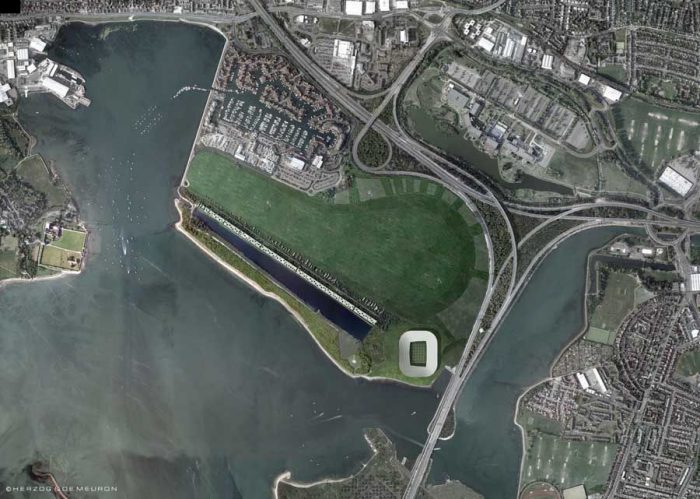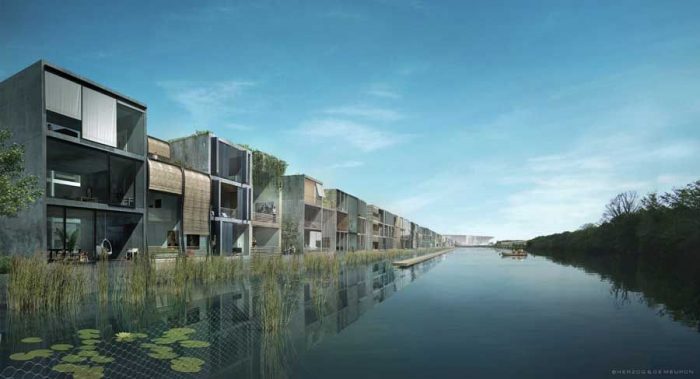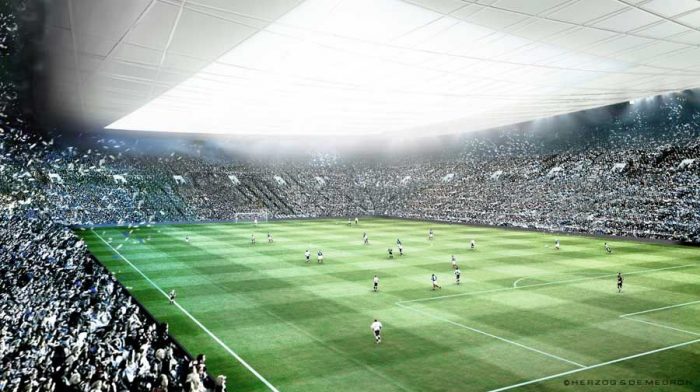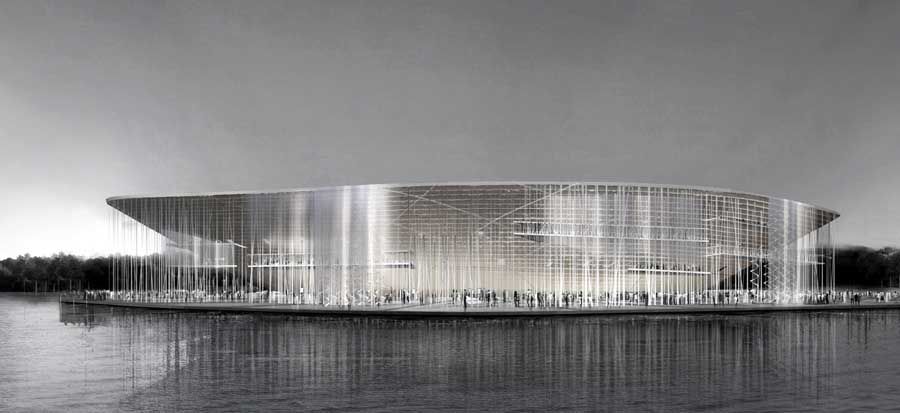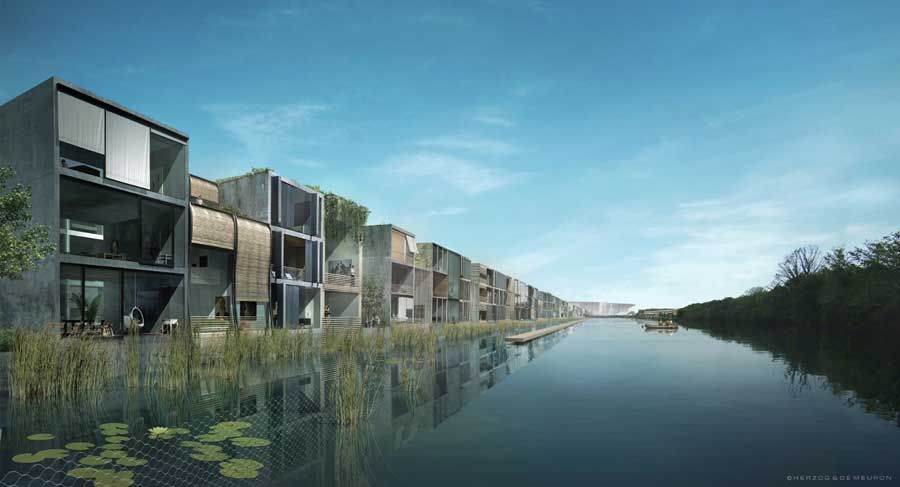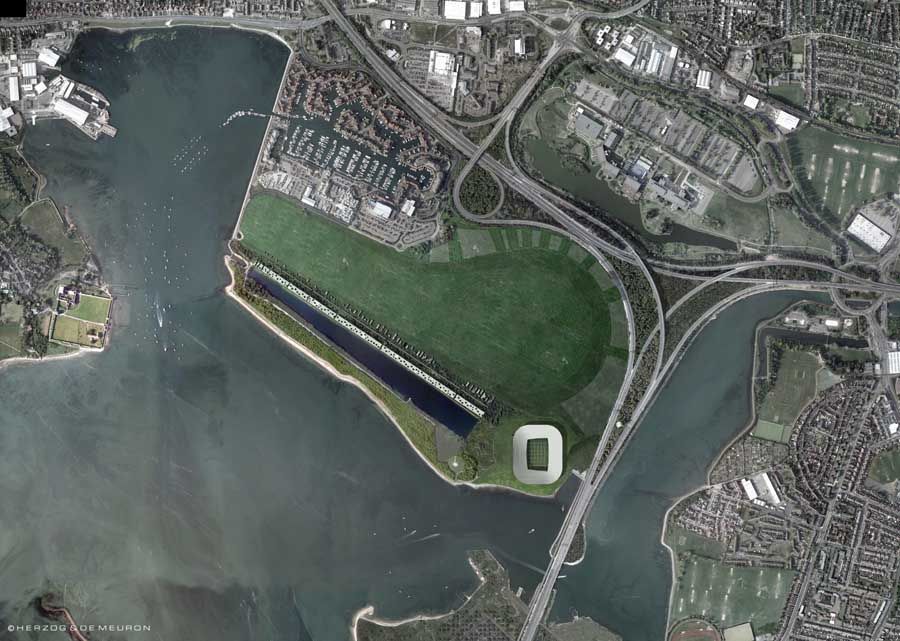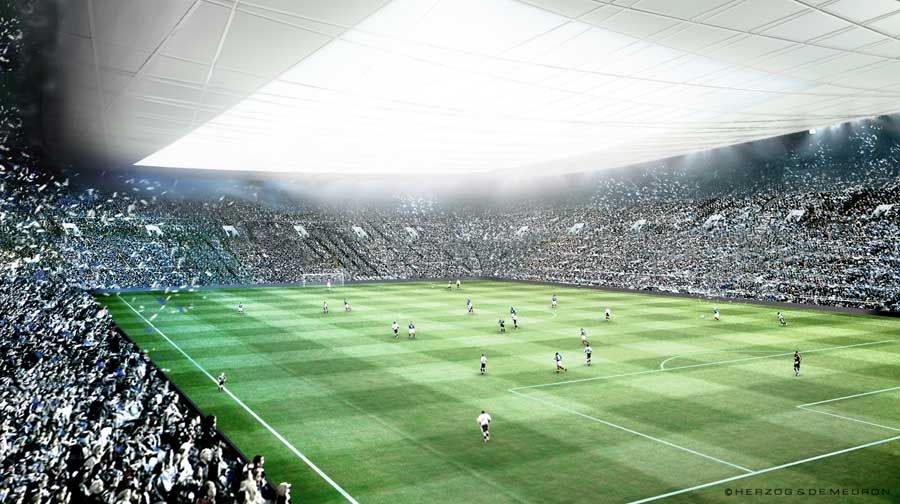Portsmouth stadium | Herzog & de Meuron
Football at the heart of the city, at the heart of the community
Portsmouth historic asset is its Docklands, they formed the city, they were its foundation and still sustain its economy. The wateredge is the heart of the city. It’s more recent but other great asset is its football. It too provides its own energy for the city and the community. With this project these two existing ingredients are combined to create a new contemporary icon for Portsmouth. The energies of the past are joined together ina order to make the future city attractive for its residents and visitors. Waterfront, football and housing converge to form a unique public space, moving the city and its people back to the water. This is a contemporary move but one which is born from tradition, the English tradition of a Football Club being integrated within its neighbourhood.
These same ingredients, the waterfront, and the ‘perfect bowl’ of the football stadium are used as form generating devices. The elements of a 36’000 seat stadium for Portsmouth FC, 100’000 sqm of housing and waterfront public space are integrated and combined to create one form.
Description
The site, ‘The Hard’, is located at the junction of Portsmouth’s two distinct urban typologies: the Docklands and the City. This situation is unique, it is the confluence of two different scales of development and a major intersection of transport facilities; rail, bus and ferry. It is a significant location, of both local and national importance: since the 15th century Portsmouth has been the main naval port of England, and as such surrounded by a dense network of fortifications.
In order to preserve these existing historic features, the footprint of the project is minimised, thus also maximising the aquatic surrounding.
The two programme elements are integrated into a dual structure: Stadium and Housing. The Stadium Concourse is expanded and opened to the public creating a public space that acts beyond the game: the concourse is independent of the dynamic of the game and incorporates the activity of a city centre in size and activity.
The site arrangement is influenced by the historic vocabulary of the Portsmouth waterfront and provides retention and improvement of the existing historic conditions and structures. For example, the HMS warrior will continue to be docked on the site, access to Mast Pond is maintained, the Detention Centre is retained and the situation of the buildings along the Hard is kept as a waterfront. The waterfront has two distinct kinds of water basins: docks and harbours. As the site is at the junction of both – the proposal respects this specificity. The ‘perfect bowl’ of the Stadium is placed to create new examples of both types: a dock area to the north for the HMS Warrior and a harbour to the south, ‘The Common Hard’. As an ideal bowl the Stadium focuses complete attention onto the game. It consists of two seating tiers with public facilities located on the Concourse and the upper tier levels and servicing occurring at the basement (pitch)level.
Housing is wrapped around the form of the stadium on the east, south and west sides. In order to take advantage of views and daylight, the height at the southwest corner rises up to 22 storeys on the waterfront. Respectful of the scale of the city and the docklands, the northeast corner is kept lower at 11 storeys. In order to create a unique waterfront promenade and to allow light down to the Concourse level, housing is separated from the stadium. The inner wall of the Housing is proposed to be landscaped as a stepped ‘green’ wall to provide acoustic protection to the apartments in close proximity to the Stadium. Although the Stadium is set within this residential area it is not detached from the site: It is connected to the water both via the Concourse and at upper levels through public loggias that link the upper tier with the sea.
The Concourse is an urban pedestrian street and colonnade along the water enlivered with cafes and restaurants. The existing bus station is reconfigured and covered with a sloping accessible roof: a new public space ‘The Hard Beach’ which recreates the historic connection with the water that occurred on the site.
Vehicular access is provided with the reconfiguration of the Bus Station. Vehicles serving the Stadium and Residents will enter off Ordnance Row under ‘The Hard Beach’ to the two basement levels. 1100 parking spaces are provided for the 1400 residential apartments and 400 for the Stadium including 50 disable spaces.
The construction phasing of the project is incorporated into the building form so that a complete shape is provided at each phase of development.
A sustainable energy scheme and a ‘Low Carbon’ energy strategy take advantage of the project location. A CHP system (fuelled by bio-fuel) and a heat pump (harbour water) will feed into a Thermal Store. Cooling will be provided via the harbour water and the roof surface with be use to provide solar hot water for heating.
Herzog & de Meuron, 2007
Project Info:
Architecture: Herzog & de Meuron
Location: Portsmouth, United Kingdom
Client: Portsmouth Football Club
Status: Current works
Type: Stadiums / Sports Facilities
courtesy of ©Herzog & de Meuron
courtesy of ©Herzog & de Meuron
courtesy of ©Herzog & de Meuron
courtesy of ©Herzog & de Meuron
courtesy of ©Herzog & de Meuron



